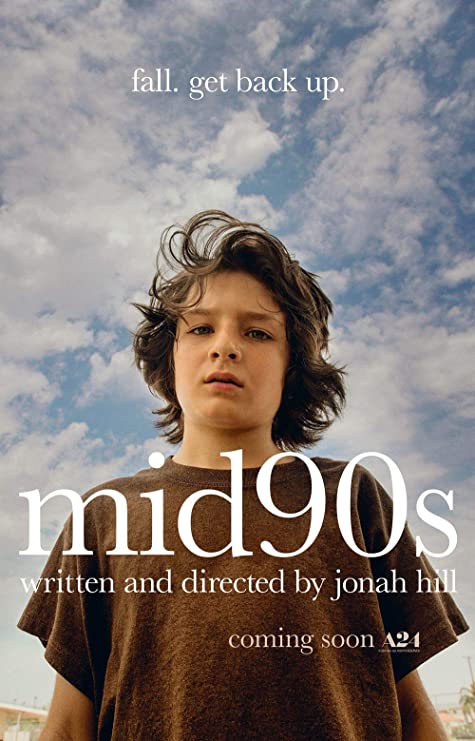
Jonah Hill’s Mid90s is a unique coming-of-age film from 2018 that is as tender and sweet as it is heart-wrenching. The film follows Stevie (Sunny Suljic), a troubled 13-year-old living in Los Angeles in the 1990s who becomes enamored with a group of skater boys he sees around town. Constantly bullied by his abusive, older brother (Lucas Hedges), Stevie lusts after the power and confidence that these kids seem to possess, and does his best to integrate himself into their group.
Stevie first befriends the youngest of the group (who is still a bit older than he is), Ruben (Gio Galicia), who offers to sell Stevie a skateboard for a discounted price. Ruben showers Stevie with the toughest of love, teaching him how to be “cool” enough to be accepted into the group of very cool kids. Stevie soon gains the affection of the older boys, and Ruben then grows jealous, beginning to resent the newcomer for occupying a space in the group that used to belong only to him. Stevie soon earns himself a nickname, and continues to melt the hearts of viewers with his giddy joy (kept hidden for appearances) at making these exciting new friends.
Suljic does a phenomenal job at portraying Stevie in the intensely emotional period of time that young kids can go through when willing to sacrifice everything for the acceptance of their peers. Stevie expresses vulnerability in his moments of elation as well as in his hardest times. As viewers, we are able to witness Stevie exuding gratitude, his heart shamelessly overflowing, only to later see him harming himself in frenzied self-loathing. These disturbing, self-harm moments are not given an isolated purpose in the film, they simply exist to add reality and depth to the character—an effect which is beautifully achieved. In Stevie’s character, Hill instills pure, reckless innocence that has the power to make audiences deeply fall for, and worry for, Mid90s’ sweet protagonist.
Mid90s shows no trace of 2018, its year of release. From the colors of the shots, to the sets, wardrobe, acting, content, and dialogue—the film truly feels, not just set in, but made in the ’90s. Stevie goes to a party with his new friends, where he meets a girl, Estee (Alexa Demie), who seems to be at least 3 or 4 years older than him. After some meaningless flirtation, Estee leads Stevie into a bedroom, and begins to engage in sexual activity with him. The scene is shocking, appalling, and sits like a rock in the stomachs of people living in 2022, 2018, and likely many people living in the 1990s. The discomfort of the situation is not even lost on Stevie, but the fear and displeasure shown in the moment dissipate immediately when he comes out a hero and receives praise from his peers. Stevie’s experience with Estee is easily distorted by his memory into a positive one, though he was clearly taken advantage of. The weight of the situation is no longer carried by him, but by us, who witnessed the event take place.
Stevie and his friends continue to smoke, drink, party, and skate recklessly every day. Stevie gets brutally injured when trying to show off, and the praise he receives for being “insane” only reinforces his behavior. The film is raw with emotion, and there isn’t a dull moment in it. The acting is flawless, and the characters feel more real than fictional. Every skater in the film, including Suljic, was asked to be a part of the film based solely on their skating background, and many of them had never acted before their roles in Mid90s.
The film’s score, by Trent Reznor and Atticus Ross, sets the mood perfectly, as well as makes the time period clear with songs by The Pixies, Nirvana, The Pharcyde and more. Every aspect of the film is beautiful and artistic, yet deeply rooted in reality. Viewers are invested in Stevie’s wellbeing from the very beginning, until the very end. Mid90s is a whirlwind of raw feeling; disturbing, heartfelt, and an absolute work of art.
Mid90s (2018)—80% on Rotten Tomatoes. Rent now on Amazon Prime!




